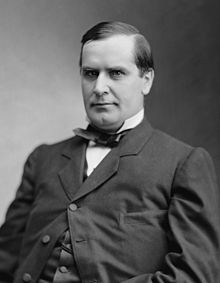We don't hear much about William McKinley, Republican president of the United States from March 4, 1897 until his assassination in September, 1901.
 |
| McKinley as President (Official Portrait) |
***
Commissioners of Patents During McKinley's Terms
Two men were appointed by McKinley as Commissioner of Patents. Those men were: Charles Holland Duell (1898-1901) and Frederick Innes Allen (1901-1907).
Duell is frequently and incorrectly quoted as saying "Everything that can be invented has been invented." Duell's father, Robert Holland Duell, was also a Commissioner of Patents under a Republican president (U.S. Grant).
According to the USPTO histories, Commissioners Allen and Duell (the younger) endeavored to keep the Office work as near current as possible, by holding divisions which were far behind in their work for an hour overtime every day. Many of the examiners also sacrificed much of their leave, and were placed in an embarrassing position generally.
***
Patent Speeches by McKinley
 |
| Representative William McKinley (R-Ohio) |
While a promoter of pro-business and protective economic theories, McKinley's speeches often addressed the benefits and the role of patents in American's economic successes. Before the House of Representatives:
Go to the Patent Office and examine the evidences furnished from that great register of the products of American genius. Take the States which have stood by the protective system, which have believed in it, which have built up under it, and contrast them with the States whose Representatives have stood in unyielding opposition to the system on this floor. See what result you get. Take Connecticut, a little State but a manufacturing one : in the year 1887 there were 788 patents granted to the inhabitants of that State, one for every 790 of its inhabitants, while for Arkansas the number of patents granted was 65, one to every 12,346. Take Massachusetts: in 1887 there were 1,875 patents granted to the people of that State, one to every 950 of her population ; while to Kentucky there were 245 patents granted, or one to every 6,729 of her population. Take Illinois : 1,595 patents were granted to her people, or one to every 1,929 of her population ; while for Georgia there were 130, or one in every 11,862 of her population. Here is the list.
These figures need no comment; they point their own moral; they enforce their own lesson. They demonstrate better than any argument that I can make that invention and progress and the general diffusion of knowledge follow manufacturing and industrial enterprises.
Excerpt from McKinley's speech in support of THE MILLS TARIFF BILL.
Before the US House of Representative, Fiftieth Congress, May 18, 1888.
***
Cincinnati, Ohio (1891):
American workmen are, as a body, the most ingenious and intelligent of the world.
Inventiveness has come to be a National trait. The United States Government issues four times as many patents as Great Britain, our greatest competitor. From the Patent Office in Washington, during the past decade, there have been issued annually from 18,000 to 22,000 patents, the greatest number in the history of any country in any previous period of the world's history. At the International Electrical Exposition at Paris, a few years ago, five gold medals were offered for the greatest inventions or discoveries. How many of them, do you suppose, came to the United States? Only five.
Testimonials to our mechanical superiority abound on every hand. The Mechanical World, of London, a great trades organ of England, says that the United States has the best machinery and tools in the world. The French Minister of Commerce has made public an official report to him that the superiority of tools used here, and the attention to details too often neglected in Europe, are elements of great danger to the supremacy of European industries.
Excerpt from "THE AMERICAN WORKINGMAN", an Address given at CINCINNATI, Ohio, on September 1, 1891.
**
If you are not a historian and McKinley's name is ringing a bell, it could be from 2015. In 2015, McKinley briefly returned to the news; though only indirectly. In 2015, then-President Obama caused some controversy when he announced the name of 20,000 foot high "Mount McKinley", in Alaska, would return to being called Mount "Denali."
No comments:
Post a Comment